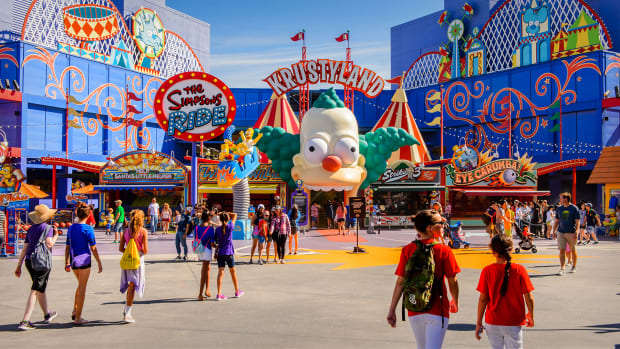Walt Disney's (DIS) Disney World and Disneyland compete with Comcast's (CMCSA) Universal Studios theme parks, but the relationship is complicated. The two massive entertainment brands fight each other for customers but they're also in business with each other in multiple ways.
First, in Florida Universal holds the rights to many of Disney's Marvel characters. That deal predates Walt Disney buying the comic-book company. It was made at a time when Spider-Man, the Avengers, Fantastic Four, the X-Men, and the Avengers were comic-book characters, not giant movie stars.
Universal has perpetual rights to those popular characters, who have become more valuable since Disney took ownership of Marvel and created the wildly successful Marvel Cinematic Universe.
Disney gets paid for its intellectual property, but the theme park company would likely prefer to have the right to bring those characters to Disney World.
That deal is not likely to change anytime soon because the rights never expire as long as Comcast uses the characters and makes the payments required by the contract.
Universal Studios Florida has a large part of its Islands of Adventure theme park devoted to Marvel with a signature roller coaster themed to the Hulk and a top-tier attraction built around Spider-Man.
Universal controls those popular Marvel characters in Florida, maybe forever, but another deal between the two companies appears set to end.

Shutterstock
Disney Owns 'The Simpsons,' a Major Universal Attraction
The original Universal Studios theme park in Florida and its counterpart in California both have a "land" based on Springfield, home to television's longest-running comedy, "The Simpsons." That deal was made before Disney acquired the popular show, and unlike the Marvel deal, it appears to have an expiration date.
"We know that an agreement between Fox and Universal to use the Simpsons has an end date; what we don’t know is the length of those terms," InsideUniversal.net reported.
"Rumors indicate the duration is a 20-year licensing agreement, putting the end year at 2028. However, unlike the Marvel contract, there is no “in perpetuity” clause or region-based restrictions."
The 20-year deal matches other news reports about when the rights expire, but neither Disney nor Universal has commented on the arrangement. And while 2028 is more than five years away, there are some anecdotal signs that Universal may be prepared to move on from "The Simpsons."
Some of the screens at the signature "The Simpsons Ride" have needed updating for years; your ride experience varies depending on which ride vehicle you get. In addition, the underlying technology will be nearly 40 years old in 2028 and the show's popularity has faded at least somewhat.
Would Disney Want 'The Simpsons?'
"The Simpsons" is an edgier property than much of the IP Disney owns, but the show is featured prominently on the Disney+ streaming service.
It's hard to picture Bart, Homer, Marge, Maggie, Lisa, and their supporting characters at Disney World next to the company's classic characters, but the long-running show makes sense at Disney's Hollywood Studios in Florida and Disney's California Adventure in California.
And while "The Simpsons" may not be quite as popular as it once was, the characters are very important to parents who are now in their 30s and 40s. Disney has always been built around nostalgia: Mickey Mouse, Donald Duck, and friends are not nearly as relevant to kids today as, say, the cast of "Frozen" is, but they remain a huge part of Disney's theme parks.
"The Simpsons" may make more sense at Disney's theme parks in a few years than they do at Universal's, though the two companies could still extend the deal. If Disney does not want to invest in a "Simpsons" attraction, it could make a short-term agreement with Universal to keep the current land and rides in place.
Those decisions likely won't get made for a few years after Universal Studios has opened its upcoming Epic Universe "third gate" in Florida.
The state of "The Simpsons" may very well hang on whether Disney wants the rights back because it intends to use them at one or more of its U.S. parks.







